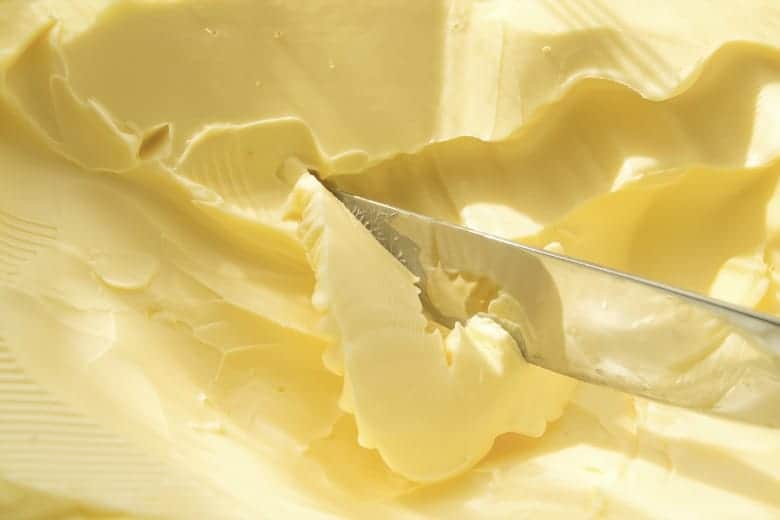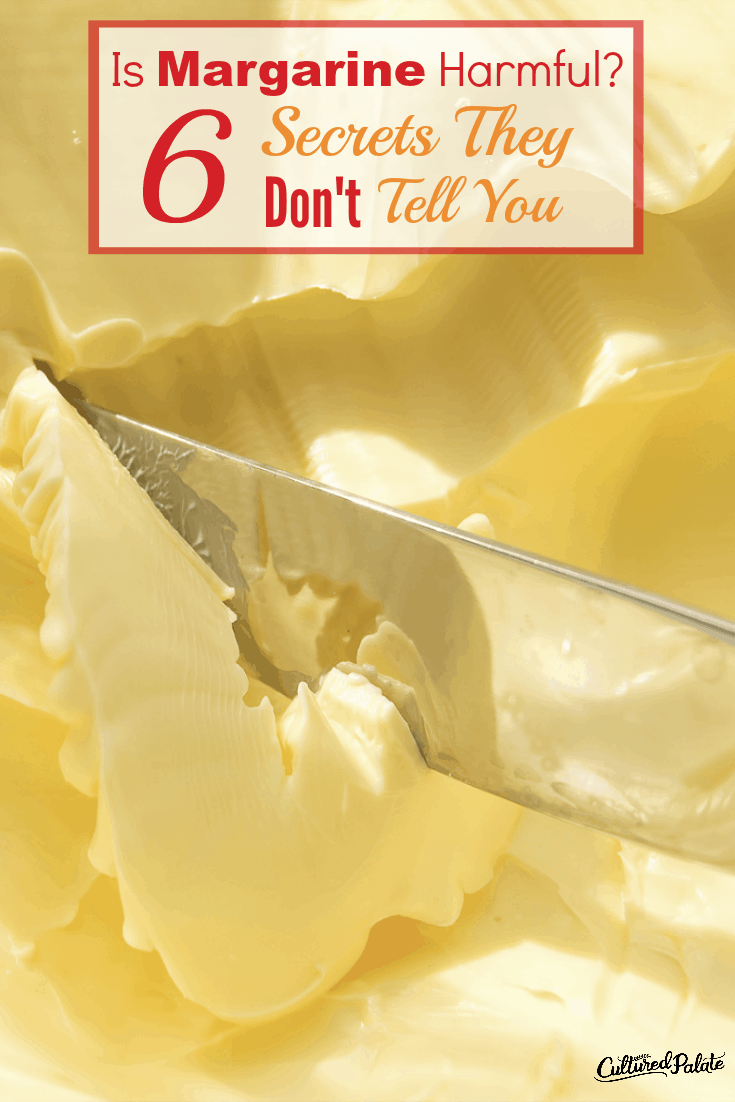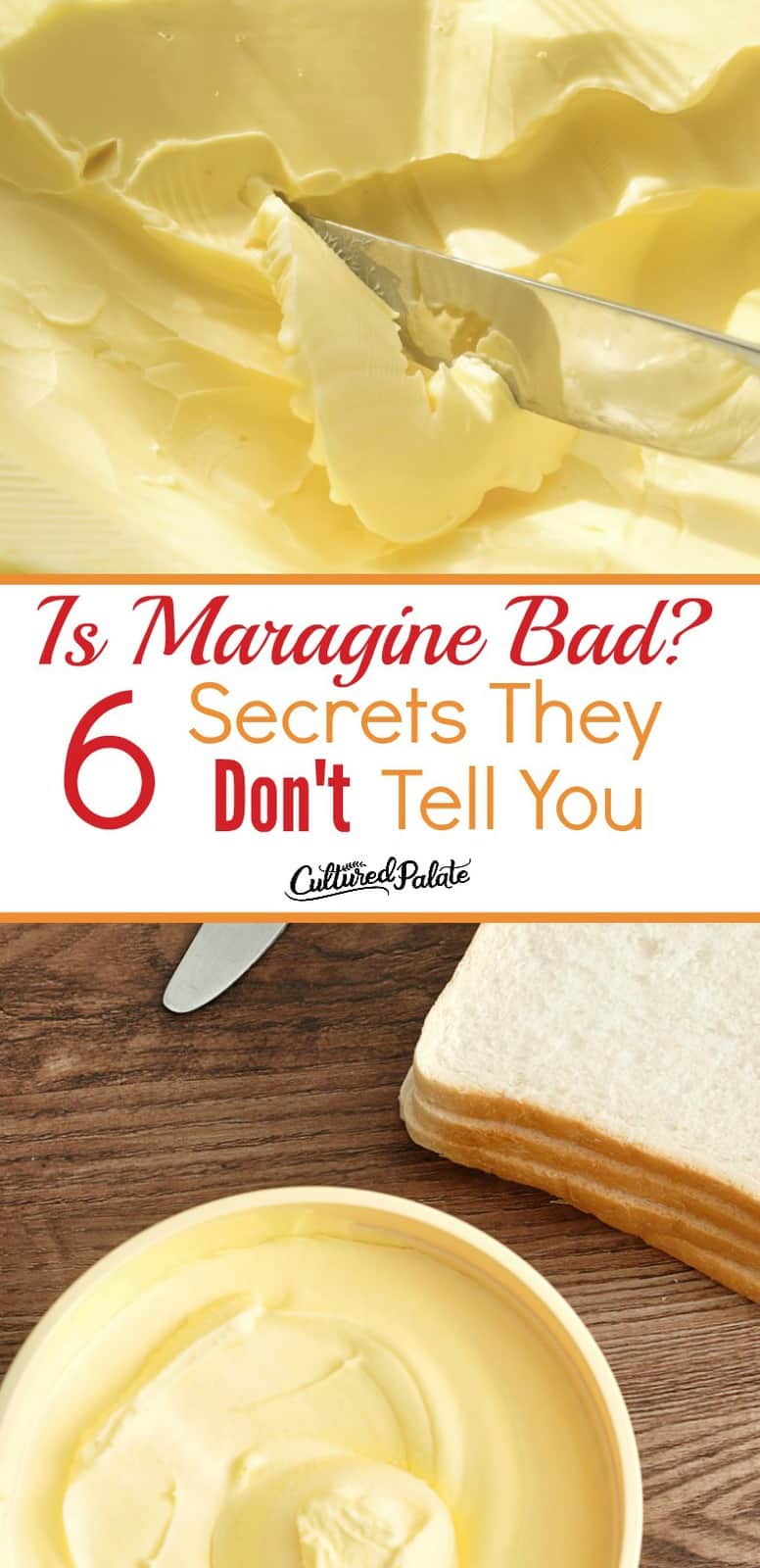Is Margarine Harmful? Or, to put it another way, is margarine bad for you?
Let's take a look at what margarine is, the side effects of margarine, and the disadvantages of margarine.

My mother had a mild heart attack the week before Thanksgiving and was found to have an 85% blockage in one of her coronary arteries.
She was put on a low-fat diet which contained margarine.
Is Margarine Good or Bad?
What food do you think of as being full fat? For me, it is butter, rich creamy butter. Unfortunately, butter is a big no-no on a heart healthy diet.
So, when looking for a "heart healthy" alternative to butter, margarine is recommended - according to the doctors!
After all, who would want butter, full of fat and saturated fats at that! At the risk of being politically incorrect, saturated fats are good for you! But margarine ...
According to the Free Dictionary:
A fatty solid butter substitute consisting of a blend of hydrogenated vegetable oils mixed with emulsifiers, vitamins, coloring matter, and other ingredients.
[French, from Greek margaron, pearl] And...A substitute for butter, prepared from vegetable and animal fats by emulsifying them with water and adding small amounts of milk, salt, vitamins, colouring matter, etc
What is Margarine?
From the above quote, we see that margarine is made up of the following:
- Hydrogenated vegetable oils and possibly some animal fats mixed with emulsifiers
- Salt
- Vitamins
- Coloring
- Other ingredients
Hydrogenation is the process used to make liquid vegetables oil solid.
Hydrogenation increases the oil’s saturated fat content, but unhealthy trans fats are formed as a side product. (1)
The History of Margarine
Margarine was created in 1870 by a Frenchman from Provence, France -- Hippolyte Mège-Mouriez -- in response to an offer by the Emperor Louis Napoleon III for the production of a satisfactory substitute for butter.
He used margaric acid, a fatty acid component isolated in 1813 by Michael Chevreul and named because of the lustrous pearly drops that reminded him of the Greek word for pearl, margarites - and - he claimed the Emperor’s prize.
Margarine has had a colorful history to say the least!
In fact, at different points in history:
- 27 states prohibited the manufacture or sale of colored margarine
- 24 imposed some kind of consumer tax
- 26 required licenses or otherwise restricted margarine sales
But, with advertising and new packaging, it reached consumers who eagerly devoured the fake stuff.
1998 marked the 125th anniversary of the U.S. patent for margarine.
Low-Fat Myth
Everywhere we turn we hear how good a low-fat diet is for us - from television commercials to the American Heart Association.
But, looking at the nation as a whole shows a different picture than what the medical community proports.
In the 1960s, fats and oils supplied Americans with about 45 percent of calories - about 13 percent of adults were obese and under 1 percent had type 2 diabetes.
Today, Americans take in less fat, getting about 33 percent of calories from fats and oils - yet 34 percent of adults are obese and 11 percent have diabetes, most with type 2 diabetes.
It is time to expose the myth that a low-fat diet is good for you!
Low-fat is not what the human body needs - In fact it is harmful!
Quality of Fat is Important
Not all fats are created equal as is the case with butter made from the milk of grass fed cows vs the butter made from grain fed cows.
According to Healthline:
Butter from grass-fed cows contains much greater amounts of heart-healthy nutrients than butter from grain-fed cows.
Is Margarine Harmful - 6 Secrets About Margarine "They" Don't Tell You:
1. Margarine is high in trans fatty acids.
The disadvantage of true margarine is the trans fat level. (butter vs. margarine)
A study done in Boston, at the Harvard School of Public Health showed that trans-fatty acids do increase the risk of heart attack.
In fact, the risk of heart attack more than doubled between those who ate the most and those who ate the least foods containing vegetable oil trans-fatty acids.
The more solid a margarine is at room temperature, the more trans fat it contains, as much as 3 grams per tablespoon.
Even the improved brands, such as Smart Balance, are full of:
- artificial ingredients
- synthetic vitamins - which do nothing to boost your immune system (as those found in real butter do)
- artificial colors - because without them the products don't appeal to customers
2. Margarine actually contributes to heart attacks.
Another study done by the Harvard School of Public Health asked people how much margarine they ate.
Once the answers were recorded they waited to see what they died from.
Amazingly, people who ate as little as three pats of margarine a day had twice the heart-attack rate of those who ate less than a pat a day, far worse than those who ate lard or butter. (3)
3. Margarine increases cholesterol.
Not only does margarine increase total cholesterol, it also increases the LDL (the bad cholesterol). Source: butter versus margarine (harvard.edu)
If that were not enough, margarine lowers the HDL which is the good cholesterol!

4. Margarine lowers quality of breast milk.
Studies show how a mother's eating of trans fats affects the level of trans fats in her milk.
One study, for example, comparing Canadian breast milk to Chinese breast milk found that Canadian mothers had 33 more trans fats in their milk than the Chinese mothers.
So trans fats consumptions may affect the quality of breast milk. (5)
5. Margarine decreases immune response.
According to Dr. Mary Enig, author of Know Your Fats (affiliate link), consuming trans fatty acids
Affects immune response by lowering efficiency of B cell response and increasing proliferation of T cells.
This decreases the body's immune response.
6. Decreases insulin response.
Actually, the trans fats can increase blood insulin levels, which increases the risk for diabetes. (6)
Margarine Disadvantages
So, let's summarize the disadvantages of margarin that help us decide if margarine is good or bad.
Margarine:
- Is high in trans fatty acids.
- Contributes to heart attacks.
- Increases cholesterol.
- Lowers quality of breast milk.
- Decreases immune response.
- Decreases insulin response.
Mistake in Research
So, if margarine is actually bad for us, how did it get to be so popular? Pure and simple - money!
Margarine gained popularity beginning with America's entry into World War I when there was a shortage of fats and cost of living was high.
Therefore, a cheaper alternative to the more expensive butter was quickly received by the uninformed public.
Dr. Mary Enig discovered during her research that the studies linking saturated fat to heart disease were wrong.
Saturated fats along with trans fats (partially hydrogenated fats) had been grouped together because of there similar chemical structure. This was done for analytical purposes.
These "minor" difference, however, made all the difference in the world to the conclusion of the research.
Dr. Enig found that when separated into different groups, saturated fats were found to have NO LINK to heart disease while trans fats were found to have a very strong link!
Unfortunately, when Dr. Enig tried to make others aware of the mistake, she was cast out.
Naturally the edible oil industry whose profits she so threatened opposed her findings and she found herself unable to get grants, funding, or even a job.
Fortunately for us, she has continued her research quietly and is now on the board of the Weston A. Price Foundation.
What About "Heart Healthy" Substitutes?
You might be tempted to compromise with heart healthy oil blends. But, think again!
The word "Smart" should be taken out of Smart Balance!
As mentioned earlier not only is it:
- full of artificial ingredients
- synthetic vitamins which do nothing to boost your immune system (as those found in real butter do)
- artificial colors
But, the process to make them is called "interesterification" which may be even more dangerous to health than trans fats!
Source: what are interestified fats
You can read more about the process at what is interestification.
So, back to my question - is margarine harmful?
Personally, I'm sticking with the natural stuff from now on! How about you?
Pin It!






Vincent says
How about smart balance is that good Or bad for you
Dina-Marie says
Vincent, I think they have recently reformulated it and I have not checked it. But, at last check, they were not using the healthiest oils so I am still sticking to butter.
Annie Klement says
I use Blue Bonnet margarine in all my bakings, is this a no no. Is it still bad for you. I do alot of baking. Should I be using butter. Although there is some butter out there that is not pure butter.
Skylar says
Regardless of the brand, margarine is margarine.
Larrecia Shealey says
I use real butter and ghee just like I do full fat milk and a real coca cola if I want one I stick with real
christine may davy says
I havebeen trying to tell people for over 50 years now that margarine is sooo bad for you but no one once to listen because of the media telling one that it is good for their hearts. They even say the heart foudation sponsors some margarine. I am 72 years old and eat only butter. I have just moved to the UK and see they have spreadable butter on the shelves is this good the same as the block butter?
My Cultured Palate says
Hey Christine! I'm not familiar with the UK market so I don't know what "spreadable butter" is over there. You'll want to look at the ingredient labels. I would personally stick with 100% natural, grass-fed butter.